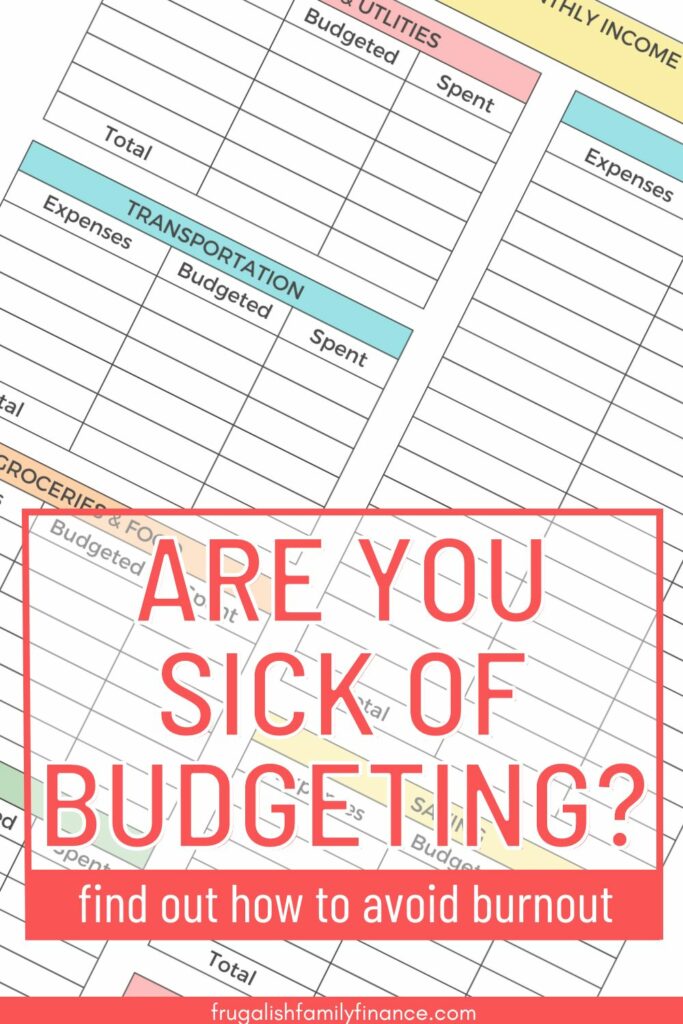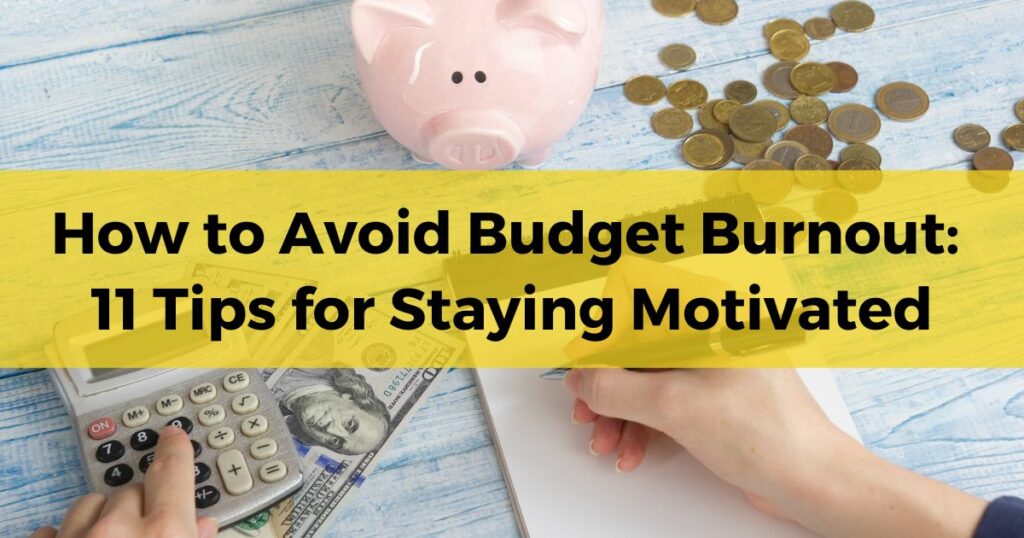Budget burnout is real y’all! If you’ve ever experienced it, you know sometimes it can be challenging to get back on track.
It can happen to the best of us, usually when we are stretched too thin and overwhelmed with our finances.
Living paycheck to paycheck, on a bare-bones budget, or too frugally can cause us to experience budget burnout.
At first, you’re motivated just from pure excitement to get your financial shit together. Then, a few months pass, and you figure out it’s more challenging than you thought.
Eventually, you’re having a mommy tantrum because you cut your budget so much that you can’t even get a weekly coffee from Starbucks! This results in a f**k it attitude, and you give up!
Burnout can be temporary or can completely turn you away from budgeting permanently. So, let’s talk about some tips for avoiding it altogether.
Disclaimer: This post may contain affiliate links. This means I receive a small commission, at no extra cost, if you purchase using the links below. Please see my earnings disclaimer for more details.
Table of Contents
What is budget burnout?
Budget burnout or frugal fatigue is the emotional and mental exhaustion you feel when tracking your spending and saving. Many things can cause it, but it’s often due to poor budgeting, a toxic money mindset, or living too frugally because of tight finances.
According to Keybank’s 2023 Financial Mobility Survey, “two in five people reported feeling overwhelmed or burned out regularly” due to the rising costs of inflation, decreased wages, and rocky economic trends in the United States.
How to avoid financial burnout
Budget burnout can possibly lead to living paycheck to paycheck, burning through your emergency fund, and even taking on debt. Therefore, here are the best tips to avoid burnout and stay the course.
Check your money mindset
Sometimes your money mindset starts to shift into a more negative state. A toxic money mindset can cause you to struggle with your budget and get burnt out.
Therefore, make sure to check in with your financial mindset.
- Does your budget align with your values?
- Are you struggling with contentment?
- Are you living intentionally?
An audit of your financial mindset will help you identify spending habits and triggers to determine why you’re struggling and how to get back on track.
Related:
5 Secrets to Master Your Money Mindset
How to Minimize Your Life and Maximize Your Happiness
Give yourself permission to spend
A restrictive budget is like a restrictive diet…you won’t stick to it. Just like a cheat meal while dieting, budgeting is no different.
You have to allow yourself to spend once in a while. I am not saying to spend money you don’t have, just make sure to budget for some fun things to keep you motivated.
Related: How to Create a Zero-Based Budget to Simplify Your Finances

Change things up
If something is not working for you, change it. What works for one person may not work for someone else. Sometimes one budgeting system works one year, and the next, you need a new one.
We have made several changes to how we track our spending throughout our budgeting journey. We started with cash envelopes, but it just wasn’t realistic for our family. We then tried paper tracking, whiteboard tracking, and now have moved on to the Everydollar budget app.
Simple changes to your household budget can really make a huge impact.
- Try a cash envelope system if you need help with overspending.
- Adjust your budget every month to ensure your budget is doable.
- Try a different budget system if the one you’re using isn’t working.
- Switch up your tracking system to help you track your spending.
Changing things up when they are no longer working can help your monthly budget and bank account.
Related:
How to Start Cash Stuffing for Beginners in 2023
12 Important Reasons and Benefits of Tracking Your Expenses
Realistic goals
Goals are what keeps us going through life, right? But if you are setting unrealistic goals, it makes them difficult to attain and can disrupt your money management.
Therefore, you want to make short and long-term financial goals. Here’s a good way to help you set realistic financial goals.
Break the bigger goals down
After you decide on specific goals, break them down into micro-goals. This way, it helps you develop a plan to reach those bigger goals.
For example, if you have a credit card with $2,000 to pay off, break it down into $200 increments. This way, you are hitting those smaller goals (the $200 milestones) and seeing progress to keep you motivated.
Set a realistic timeline
Make sure the timeline for reaching your goals is realistic. Because if your setting goals with unreasonable deadlines, you will most likely lose motivation and fail.
Track your progress
Make sure to do frequent progress checks. Check in on your goals every month during your budget meetings. Because you’re already talking about finances, it makes sense to discuss your progress toward the financial goals you’ve set.
Work together
You and your spouse have got to be on the same page about your personal finances. It makes reaching your financial goals hard if you’re not working as a team to achieve them.
The first thing you need to know is the whole picture of your financial situation and the financial challenges you’re facing.
- Monthly income
- All debt owed (student loan, personal, and credit card debt)
- Debt management plan
- Budget plan
- Savings goals
A monthly budget meeting with your spouse is a must. During these meetings, it’s a great time to review spending plan changes, budget cuts, financial needs, your to-do list, and more. Doing this will help you manage your money better together, keep you both accountable, and alleviate a lot of financial stress.
Related:
How to Slay Your Debt Using the Debt Snowball
Everything You Need to Know About Sinking Funds for Beginners
Remember your “why”
One of the best ways to avoid feelings of burnout is to remember why you want to take control of your money in the first place.
- Are you sick of living in debt and want to change the financial future of your family?
- Is there a baby on the way, and you need more stability for your growing family?
- Are you saving for a once-in-a-lifetime vacation?
Whatever the reason for budgeting and getting your finances in order, remembering your “why” can help to remotivate you.
Reward yourself
Celebrating the small wins will keep you motivated to keep going.
- Paying off a credit card.
- Staying on budget.
- Tracking your spending every day.
- Reaching a savings goal.
So, find small ways to reward yourself or your family for a job well done!
Don’t let your budget take over your life
Your budget is a guide for where your money is going every month. But you can’t let it take over your life. Sometimes people start to obsess over their budget, which becomes overwhelming and exhausting.
You have to find a balance so you’re not wasting your time and energy doing things just to save a few pennies. Just like a diet, you won’t stick with it if you’re too hardcore or restrictive.

Find alternatives
Look at your spending and find cheaper alternatives.
- Instead of going to the movies, have a family movie night with some candy and popcorn.
- Instead of dinner and drinks with friends, invite everyone over for a potluck dinner and b.y.o.b.
- Instead of paying for a gym membership, try natural workouts, free workout apps, or YouTube for your workout.
- Instead of paying for cable, find streaming services to save money and watch your favorite shows.
Finding cheaper alternatives to your spending will still allow you to enjoy yourself while cutting back on your spending.
Related:
106 Frugal Fall Family Activities Everyone Will Love
Kids Bowl Free Summer Bowling Program for 2023
Find ways to stay motivated
Motivation will help keep your budgeting and financial goals on track.
Therefore, you need to find ways to keep you motivated.
Sometimes, it’s as simple as remembering how far you have come with budgeting or what you have because you’re in control of your money.
Other times, it’s rewarding yourself for reaching those goals or staying on a budget the whole month.
And sometimes, it’s setting a goal to work towards. Using trackers can help you visualize your hard work and keep you motivated to reach your financial goals.
Don’t do too much at once
Don’t take on too much all at once. Having too many goals or trying to cut too many things from your budget can cause frustration, overwhelm, and eventually budget burnout. Instead, take on one thing and make changes slowly to avoid it.
Conclusion
Budget burnout is real and can wreck your finances if you don’t get it under control. Make sure to follow these tips to help avoid budget burnout and stay the course to financial freedom!
How do you overcome budget burnout? Leave a comment below!





